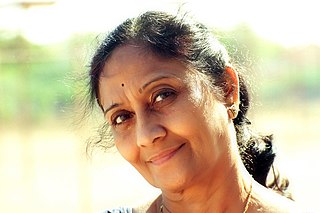Related Research Articles
Arabic literature is the writing, both as prose and poetry, produced by writers in the Arabic language. The Arabic word used for literature is Adab, which is derived from a meaning of etiquette, and which implies politeness, culture and enrichment.

Rashid Jahan was an Indian writer and medical doctor known for her Urdu literature and trenchant social commentaries. She wrote short stories and plays and contributed to Angarey (1932), a collection of unconventional short stories written in collaboration with Sajjad Zaheer, Ahmed Ali, and Mahmuduz Zafar.

Hanan al-Shaykh is a Lebanese author of contemporary literature.

Paula Gunn Allen was a Native American poet, literary critic, activist, professor, and novelist. Of mixed-race European-American, Native American, and Arab-American descent, she identified with her mother's people, the Laguna Pueblo and childhood years. She drew from its oral traditions for her fiction poetry and also wrote numerous essays on its themes. She edited four collections of Native American traditional stories and contemporary works and wrote two biographies of Native American women.
Ramziya Abbas al-Iryani or al-Eryani was a pioneering Yemeni novelist, writer, diplomat and feminist. She was also the niece of the former president Abdul Rahman al-Iryani.
Liana Badr is a Palestinian novelist, and short story writer.

Varsha Mahendra Adalja is an Indian Gujarati language feminist novelist, playwright and negotiator who won the 1995 Sahitya Akademi Award for Gujarati language for her novel Ansar. She is also a dramatist, writing for stage plays, screenplays, and radio.

Salwa Bakr is an Egyptian critic, novelist and author. She was born in the Matariyya district in Cairo in 1949. Her father was a railway worker. She studied business at Ain Shams University, gaining a BA degree in 1972. She went on to earn another BA in literary criticism in 1976, before embarking on a career in journalism. She worked as a film and theatre critic for various Arabic newspapers and magazines. Bakr lived in Cyprus for a few years with her husband before returning to Egypt in the mid-1980s.

Rakhshanda Jalil is an Indian writer, critic and literary historian. She is known for her book on Delhi's lesser-known monuments called Invisible City: The hidden Monuments of India and a well-received collection of short stories, called Release & Other Stories. Her PhD on the Progressive Writers' Movement as Reflected in Urdu Literature has been published by Oxford University Press as Liking Progress, Loving Change (2014). Jalil runs an organization called Hindustani Awaaz, devoted to the popularization of Hindi-Urdu literature and culture.
Saleha binti Abdul Rashid, better known by her pen name Salmi Manja, is a Malaysian novelist, poet, and journalist. She was among the first Malaysian professional women writers and best known for her 1960 novel Hari Mana Bulan Mana. Femininity, women's issues, and Islam are recurring themes in her work.

Sahier al-Qalamawi was a significant literary figure and politician from Egypt who shaped Arabic writing and culture through her writing, feminist activism, and advocacy. She was one of the first women to attend Cairo University and in 1941 became the first Egyptian woman to earn her Master of Arts Degree and PhD for her work in Arabic literature. After graduating, she was employed by the university as their first woman lecturer. Al-Qalamawi was also one of the first women to hold a number of chief positions including chairperson of the Arabic Department at Cairo University, president of the Egyptian Feminist Union, and president of the League of Arab Women University Graduates. Her writings include two volumes of short stories, ten critical studies, and many translations from world literature.Aḥādīth jaddatī was published in 1935.
Mqboola Chalak (1921–1986), Maqbula al-Shalak, sometimes al-Shalaq was a Syrian writer, educator, activist and lawyer.
Khawla Hamdan al-Zahiri is an Omani short story writer.
Nura Amin is an Egyptian novelist, short story writer, and translator.
Bahiya Bubsit is a Saudi short story writer.
Lutfiya al-Qaba'ili is a Libyan journalist and short story writer.
Za'ima Sulayman al-Baruni (1910–1976) was a Libyan writer and activist. She was one of the country's first short story writers in the post-independence period, publishing the collection al-Qasas al-Qawmi in 1958.
Shaykha Mubarak al-Nakhi is a writer in the United Arab Emirates, the first Emirati woman to publish a short story. In addition to a pioneer of the short story in the UAE, she is considered one of the country's best-known women writers.
Dalal Khalil Safadi was a Lebanese writer and translator. Considered a pioneer in the short story genre among Middle Eastern women, she was the first woman to publish a short story collection in Iraq.
May Muzaffar is a Jordan-based Iraqi poet, short story writer, translator, and editor.
References
- 1 2 Radwa Ashour; Ferial Ghazoul; Hasna Reda-Mekdashi (1 November 2008). Arab Women Writers: A Critical Reference Guide, 1873-1999. American University in Cairo Press. ISBN 978-1-61797-554-7.
- ↑ "Fawziya Rashid - Arab Women Writers". www.arabwomenwriters.com. Retrieved 11 December 2017.
- ↑ Dalya Cohen-Mor (16 February 2012). Arab Women Writers: An Anthology of Short Stories. SUNY Press. pp. 302–. ISBN 978-0-7914-8346-6.